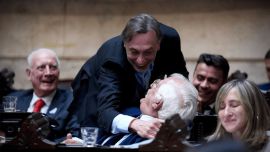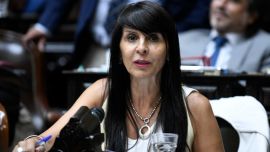"I promise you that another war will begin, the war against inflation in Argentina. We are going to put an end to speculators and we are going to put things in order."
The words of President Alberto Fernández on March 15, 2022. A year has now passed and everything indicates that inflation has won the war: price hikes last month totalled 6.6 percent and Argentina’s cumulative year-on-year figure is 102.5 percent – the highest annualised rate since 1991.
In his speech a year ago, the president had mentioned the Russian invasion of Ukraine, declaring that the war had created "economic complications" for Argentina. That’s why he delivered his vow in a warlike tone, promising that the fight against price rises would begin in earnest that very same week.
Fernández also took aim at his predecessor in office, former president Mauricio Macri: "We are having a hard time recovering from the inflation they who preceded my term in office left us, without wars and without a pandemic.” The president said his government was attempting to “resolve” the problem that had been once again “unleashed with all the ferocity that exists in the world."
When the head of state made his announcement, inflation was running at a monthly 4.7 percent (February 2022), with an annualised rate of 52.3 percent. This week, the INDEC national statistics bureau released the inflation figure for February 2023: 6.6 percent, almost two points higher than a year ago with a year-on-year rate of 102.5 percent.
According to INDEC data published Tuesday, at a national level the highest increases were registered in food and non-alcoholic beverages (9.8 percent). On average, the hikes contributed more than two percentage points to the overall rise.
Transport, up 4.9 percent, driven by the rise in fuel prices, recorded the second-highest increase, with a podium completed by household equipment and maintenance up 4.4 percent. Within the food category, according to the INDEC, "what most influenced [the figure] was a rise in vegetables, tubers and legumes (in some regions over 20 percent), in which rises in tomatoes, lettuce, potatoes and onions, among others, stood out.”
Casualties of the war
The war against inflation has led to numerous casualties in the ruling coalition. The most notable departure was that of the former economy minister Martín Guzmán, who resigned on July 2, reproached by Kirchnerism for having left his post shortly after securing a new financing agreement with the International Monetary Fund and threatened by a weakening currency.
Just one month earlier, the then-domestic trade secretary Roberto Feletti had quit his price over disagreements with the government’s price-control scheme. He was replaced by Guillermo Hang, who only lasted 44 days in the post. The economics graduate took the decision to step down when Guzmán announced his resignation.
Another who had a fleeting spell in the post was Martín Pollera, the man appointed to replace Hang. He took over on July 6, 2022, and by August 29, his resignation had been submitted. Pollera, an economist, had been part of the team appointed by Silvina Batakis, who took over the portfolio after the departure of Guzmán and lasted just a month in the post before Sergio Massa was appointed as head of the portfolio.
Critics
On Wednesday, Argentina’s main opposition leaders remembered the “first anniversary” of Fernández’s war against inflation declaration with critical messages on their social networks. Juntos por el Cambio presidential hopefuls Patricia Bullrich and Horacio Rodríguez Larreta were among those who criticised the president. "There is no pocket that can withstand," said the PRO party leader, with the Buenos Aires City mayor declaring that “our money is worth less" than it was a year ago.
For her part, opposition Buenos Aires City lawmaker María Eugenia Vidal wrote on her Twitter account: "One year on from the Friday when Alberto Fernández announced the war against inflation, we have 102.5 percent year-on-year inflation. Results of the fourth Kirchnerite government.”
In a subsequent tweet, the former Buenos Aires Province governor said that that three-digit rate “is not a number: it's parents who can't afford to buy meat, workers who can't buy a jacket, shopkeepers who can't sell, young people who are betting on emigrating. Three years waiting for an economic plan.”
She concluded: “Take charge, Alberto Fernández and Sergio Massa.”





















Comments